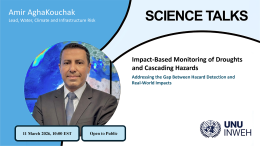Kuala Lumpur, Malaysia – 09/01/2024 – The United Nations University International Institute for Global Health (UNU-IIGH) today unveiled its Strategic Plan for 2024-2028, "Addressing Inequalities in Global Health."
Underlining the urgency of this initiative, Rajat Khosla, Director of UNU IIGH said: "The next five years are critical if the polycrisis is not to worsen. Momentum for change is building, demanding the decolonisation of global health and addressing power asymmetries in various global health processes. To achieve a meaningful shift in power between and within countries, and to transform the global health architecture, we need unprecedented cooperation between academia, CSOs, social movements, and multilateral organizations."
The new strategic plan encompasses four work packages:
1. Gender Equality and Intersectionality: through this work, we will aim to improve the quality of health care through a human-centred approach, by ensuring the health system is responsive to the needs of structurally excluded individuals and communities; and by advancing a positive and enabling environment for the frontline health workforce—e.g. addressing the experience of gender-based violence.
2. Power and Accountability: through this work, we will catalyse equitable shifts in power and address key accountability deficits that prevent the equitable and effective functioning of the global health system and prevent adequate responsiveness to the needs of states and populations in the Global South.
3. Digital Health Governance: through this work, we will address the colonial legacies and power asymmetries that negatively impact robust digital health governance, identify ways to strengthen health data governance with a particular focus on SRHR and promote diversity in technology design and development.
4. Climate Justice and Determinants of Health: through this work we will leverage UNU-IIGH's position within the UN and network of UNU institutes, network experts, practitioners, policy-makers, and academics to advance evidence-based policy on the different dimensions of the climate emergency and its impact on health.
"The strategic approach that the Institute has adopted in Addressing Inequalities in Global Health—to be recognised as the thought leader and primary intellectual resource on inequalities in global health—will ensure UNU-IIGH plays a pivotal role in attaining the 2030 Sustainable Development Goals," stated Professor Tshilidzi Marwala, Rector of the United Nations University.
At the core of this strategic plan lie multiple lenses that would inform all work. The lenses are the conceptual and analytic foundations of the Institute’s work that are in turn, rooted in principles and values informed by the UN Values Framework. The Institute has taken power as the analytical entry point to apply a set of five interconnected lenses that will facilitate collaboration across the four work packages to interrogate the structural underpinnings of health inequalities in global health—Intersectionality, Feminism, Decoloniality, Contextualisation, and Powerful Actors.
UNU-IIGH's strategic approach also encompasses key tactics. The tactics outline how the Institute will achieve specific programmatic outcomes that together will contribute to the overarching aim of addressing health inequalities. Each work package will draw on a combination of the following five tactics:
1. Conducting Research and Analysis: Collaborating with a diverse spectrum of stakeholders, including researchers, government bodies, civil society, marginalised communities, and academia, to undertake research and generate analyses that contribute to evidence-informed policy dialogue, development, and review.
2. Fostering Partnerships and Networks: Strengthening existing partnerships and forging new networks across the global health ecosystem and beyond. The Institute aims to bring low- and middle-income country leadership and voices to the fore.
3. Communicating Findings and Results: UNU-IIGH will ensure co-created research influences evidence-informed policy and decision-making. The Institute will share impactful stories and lessons from research, aligning messaging with communication objectives and stakeholder needs.
4. Advocating for Change: Leveraging its independent position to advocate for novel approaches in global health, supporting marginalised voices, and championing power sharing and redistribution.
5. Strengthening Capacity: Producing high-quality knowledge products and training programs to bolster evidence-informed decision-making. The Institute will expand its network and reach, acting as a South-South learning hub for global health.
Flavia Bustreo, Chair of the International Advisory Board (IAB), emphasised the significance of this strategic direction: "Addressing Inequalities in Global Health will ensure that UNU-IIGH is well positioned to play a key role in enabling UNU to achieve its vision of enhancing the visibility and the impact of UNU across important sectors of society and expanding UNU’s engagement in the Global South."
For more detailed information about UNU-IIGH's Strategic Framework 2024-2028 and to join in reshaping global health, please click HERE
***
About UNU IIGH:
UNU International Institute for Global Health (UNU-IIGH), located in Kuala Lumpur, Malaysia, is the dedicated UN think tank specialising in global health. Established by the United Nations University Council in 2005, it acts as a crucial nexus connecting UN member states, academia, and agencies. UNU-IIGH translates research into actionable policies, prioritising gender perspectives to shape, implement, and evaluate health programs. It focuses on empowering local decision-makers, aligning efforts with the 2030 Sustainable Development Goals. Their multifaceted approach integrates policy analysis, gender considerations, and capacity-building initiatives, fostering impactful progress within the broader UN agenda.



